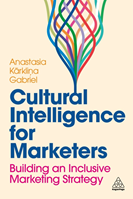An Excerpt from Cultural Intelligence for Marketers
March 21, 2024
Brand marketing is not just a business activity but a cultural phenomenon. Marketers must understand how to harness their strategies for both commercial success and social responsibility.
 Marketing has evolved beyond just selling products to consumers. Nowadays, brands often design marketing strategies that incorporate overarching narratives to connect with audiences and impact society as a whole.
Marketing has evolved beyond just selling products to consumers. Nowadays, brands often design marketing strategies that incorporate overarching narratives to connect with audiences and impact society as a whole.
In the following excerpt from her new book, Cultural Intelligence for Marketers, cultural theorist and strategist Anastasia Kārkliņa Gabriel highlights the deeply symbolic nature of brands and symbols in today’s media landscape. She calls upon marketers to understand the broader significance of their marketing strategies and how they can be used for the greater good.
◊◊◊◊◊
Marketing as Cultural Output: Transforming How We Market
Brands are in the business of transferring strategic messages to audiences with the intention of influencing their behaviors and perceptions. Being implicated in the process of media production and consumption, brand marketing is inescapably a part of what we call “meaning-making” in a culture. How could it not be? As marketers, we are not only putting products or services in front of the audiences. No, we package these products and services within narratives that are emotionally resonant and appealing. After all, that’s what strategy ultimately is—storytelling that is strategic in a way that it uses emotional resonance to achieve specific outcomes. Whether increasing brand awareness at the top of the funnel or driving low-funnel purchase behaviors, marketing strategy aims to incite behavior in response to specific stimuli.
Whether the goal is boosting brand awareness or driving sales, marketing strategies are crafted to elicit specific behaviors using cultural narratives around us. Marketing taps into the underlying cultural “ideology” that shapes people’s wants, desires, and values, using insights into cultural patterns and human behavior to craft narratives that resonate. Here, “ideology” isn’t referring to political affiliations but rather to the unwritten rules and shared beliefs that guide our actions and decisions. Because brands don’t merely sell products. Brands sell aspiration.
Just think about what most globally successful brands have in common. From Nike and Apple to Disney, Chevrolet, and Chanel, brand narratives encapsulate some kind of ideological meaning that resonates with us, whether it’s the age-old desire for social status, the appeal of innovation, the nostalgic allure of tradition, the fulfillment of athletic achievement, or a longing to recover a sense of magic in our lives. As Holt and Cameron (2012) demonstrate in their seminal book Cultural Strategy, the most iconic and successful brands tap into cultural ideologies that not only resonate deeply with societal values and operating beliefs at the time but excavate new emergent narratives that speak to our deepest desires. These brands are irresistible to us precisely because they pay attention to cultural disruptions and harness these shifts in real time to innovate and deliver a better ideology when there is a demand for it within the culture. Holt and Cameron call these moments of “ideological opportunity,” which, as they write, “provide one of the most fertile grounds for market innovation.” Culture is embedded into the DNA of most successful brands out there.
What all of this points to is that brands are deeply symbolic; brands are cultural containers imbued with meaning, much like religious symbols or totems. As Marita Sturken and Lisa Cartwright note in Practices of Looking (2001), if religions used language and imagery throughout human history to convey “religious myths, church doctrines, and historical dramas,” then brands do essentially the same in today’s saturated mass media landscape. In her TED Talk titled “How symbols and brands shape our humanity,” Debbie Millman explores a similar idea when she says, “Our greatest innovations aren’t brands providing a different form or a different flavor of our favorite snack. Our greatest innovations are the creation of brands that can make a difference in our lives and reflect the kind of world that we want to live in.”
In today’s culture, Nike’s “swoosh” logo or Apple’s iconic apple silhouette are hardly just visual designs on a blank screen or a cardboard package. Similar to deeply meaningful religious symbols that have created groups of loyal followers through history, brands are complex and sophisticated repositories of meaning that use cultural codes, or what cultural theorist Roland Barthes called “myths,” to represent something much more meaningful than the material essence of a product offering.
Brands are inseparable from culture, and so brand marketing is not only a strategic business activity but in itself an irrevocably cultural output. Much like religious symbols or totems, brands encapsulate a set of associations that consumers form while engaging with mass media. To truly leverage culture in ways that are not only commercially successful but socially conscious and inclusive, we must understand how to use this influence responsibly. And it starts with truly embracing the idea that brands are cultural agents.


